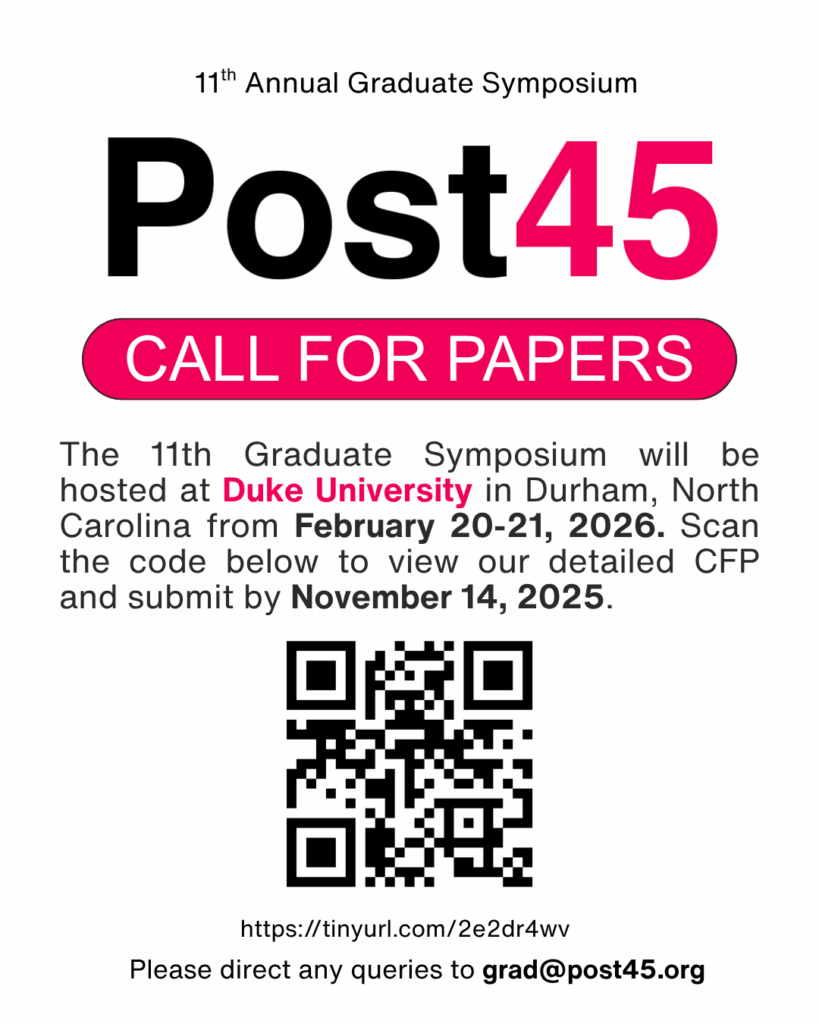Call for Papers: Post45 Graduate Symposium 2026
The 11th Annual Post45 Graduate Symposium
The English department at Duke University is thrilled to host the 11th annual Post45 Graduate Symposium on February 20-21, 2026.
The Post45 Graduate Symposium seeks graduate-level works-in-progress related to post-1945 media, arts, literature, textual or visual objects, digital platforms, politics, and culture. We welcome submissions that expand our conception of objects and meaning-making post-1945 or place them in comparative, transnational, or hemispheric frames. We especially welcome contributions that foreground the importance of race, gender, class, and sexuality to post-45 studies.
Further, we invite (though do not require) engagements with our symposium theme of "Sociality". Understood as both 'the disposition or tendency to live in a society or to associate with others' and 'companionableness', we are interested in responses that think through the different resonances of social life in our presents: physical and digital spaces of sociality; the institutional and counter-institutional; activism and anarchist organising; the connective affordances and failures of language; mediated ways of knowing (each other); friendship; anti-companionableness and/or misanthropy; forms of social knowledge; the materiality of social connection in a post-1945 context; miniature and massive structures of sociality; narrating social dis/connection; social edges and hinterlands; hostility and hostile environments; etc.
This symposium operates by a roundtable work-in-progress format, and works-in-progress will be pre-circulated two weeks in advance of the conference date. Papers will only be limited by a length of 15 double-spaced pages; besides this, we welcome proposals for a wide range of written submissions in both traditional and non-traditional forms, including conference papers, articles, dissertation chapter drafts, and/or creative-critical writing projects. Pre-circulating materials ensures participants can consider submissions carefully and generate thoughtful, critical feedback—a benefit often absent in traditional conference formats. Each individual paper will also receive feedback from a faculty respondent and 30 minutes of discussion amongst all symposium participants. In addition to the paper workshops, the symposium will feature a keynote address and a roundtable discussion on the topic "Sociality & the University." The discussion will address the role of the university in mediating social connection vis-à-vis the offline—particularly in this moment when anti-intellectual actors call into question the value and necessity of a university education.
We encourage graduate students from all locations to apply. Our committees represent graduate students from multiple countries, and we will enthusiastically consider paper abstracts from anywhere. At the same time, we acknowledge that the current US political climate poses serious limitations and risks for crossing borders and applying for visas to enter the United States. We recognize that the situation is volatile and in flux, and we will do all we can to create an inclusive and safe symposium. If participants cannot secure adequate funding from their institutions, some financial support for travel will be allocated based on need. While this support will not fully fund all expenses for each participant, we plan to do everything we can to make the symposium accessible for those traveling nationally and internationally to Durham, North Carolina.
Post45 is a collective of scholars working on literature and culture since 1945. The group was founded in 2006 and has met annually since to discuss diverse new work in the field. The Post45 Graduate Symposium meets annually to discuss works in progress. Now in its eleventh year, the Grad Symposium has convened in the past at University of Michigan at Ann Arbor, Concordia University and McGill University, University of Washington, Northwestern University, University of California Irvine, Rutgers University, Princeton University, Yale University, University of California Berkeley and Stanford University, and University of North Carolina at Chapel Hill.
Submissions
Those interested should submit 250- to 300-word abstracts through the following Google form by November 14, 2025.
Note: the form will collect your name, academic affiliation, paper title, and abstract. To facilitate the anonymized submission process, we ask that you fully anonymize your paper abstract before submission. Your abstract should not include your name or your institution's name (including in the name of your uploaded file).
